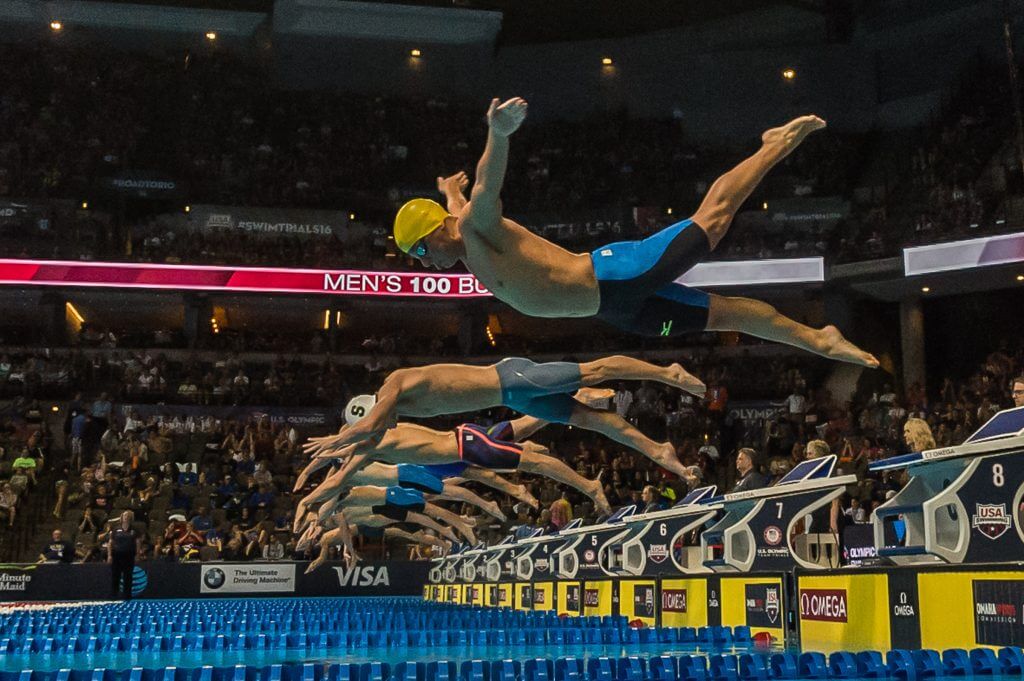U.S. Olympic Swimming Trials Feature a Harshness Like No Other

U.S. Olympic Swimming Trials Feature a Harshness Like No Other
From track and field to gymnastics and rowing to wrestling, no one wants to be the athlete who is narrowly denied an Olympic berth. Yet, that is the nature of sports, and regardless of the discipline, the heartache of a few can outweigh the euphoria experienced by those who achieve their Olympic dream.
The selection process for the United States Olympic Swimming Trials has been well documented through the years. But just in case you need a refresher, here it is: To earn an individual berth to the Games, an athlete must finish first or second in his/her event. Everything else is the equivalent to a last-place finish.
As the Olympic Trials unfold over nine days in Indianapolis, there will be plenty of feel-good stories and several stinging tales. As we prepare for those moments, let’s throw out this thought: It can be argued that no sport boasts an Olympic-selection process as difficult or potentially painful as the one used in swimming.
Let’s compare, for a moment, the three sports which are considered the banner disciplines of the Olympic Games — track and field, gymnastics, and swimming. In track and field, countries are allowed to send three athletes per event to the Games. That one extra spot over swimming is huge, especially given the United States’ prowess in the pool.
Meanwhile, politics can play a significant role in the selection of the gymnastics team, as a committee selects those who will represent the USA. Any time a committee is involved, the door is open to such angles as bias and lobbying. Meanwhile, multiple competitions are used for consideration in gymnastics, and scoring is subjective.
In swimming, there is no room for argument. The clock won’t hear of it. There is no, “But I set a world record last month.” It doesn’t matter.
“I think one of the things about this meet is that it’s iron sharpening iron,” said U.S. women’s coach David Marsh at the 2016 Trials. “There’s a lot of blood shed in that pool.”
Don’t be mistaken, the Olympic Trials offer opportunity. It is a special designation to be a Trials qualifier and for those with Olympic aspirations in the future, the meet provides valuable experience. Yet, for those chasing five-ring glory, that’s where the harshness of the competition stands out.
There is no sympathetic side to the swimming trials. At some point every fourth year, it is guaranteed that someone will be locked out of the Olympics by a few hundredths of a second, maybe a hundredth. Perhaps that individual will have an opportunity to atone for the near miss in another event and will get the job done. Perhaps, he/she will not, as was the case with Hayley McGregory.
At the 2008 Olympic Trials, McGregory was third in both the 100 and 200 backstroke events. Making her story more excruciating was the fact that McGregory was the third-place finisher in both events at the 2004 Olympic Trials, too. On four occasions, McGregory saw her Olympic hopes come up one slot short. It doesn’t get more painful.
Simultaneously, there are tales of redemption. Famously, Pablo Morales shockingly failed to make the 1988 Olympic Team for Seoul. Four years later, at the 1992 Games in Barcelona, Morales claimed gold in the event. More, Brendan Hansen went from a pair of third-place finishes at the 2000 Olympic Trials to world-record status and a career highlighted by six Olympic medals between three Olympiads (2004-2012).
“It’s intense,” Hansen once said about Trials. “You know you have this one chance and if you don’t get the job done, you’re looking at a four-year wait. For me, I used what happened (in 2000) as a learning experience, and as motivation.”
Several countries utilize discretion when selecting their Olympic squads. In some instances, athletes who are reigning world champions are pre-selected, or swimmers with specific world rankings are named to the Olympic team. Even Australia, which adheres to a selection process similar to that of the United States, has relaxed its policy in the past.
At the 2004 Australian Olympic Trials, world-record holder and reigning Olympic champion Ian Thorpe lost his balance on the starting block ahead of the 400 freestyle. When Thorpe tumbled into the water, he was disqualified. Yet, Australian officials allowed Thorpe to contest the event at the Athens Games when Craig Stevens, who qualified in Thorpe’s Trials absence, yielded his spot to his more-famous compatriot.
In several events, the United States is deep enough that three or more athletes have the ability to contend for Olympic medals. Only two will go, and that third individual could watch the Games and see a time he/she has bettered earn a medal. It may not seem fair, but it is reality.
Swimming can be a lonely sport, evident in the training sessions which require a close friendship between the athlete and a solid black line. There are directions provided by coaches and time for chatter with teammates, but there is also a significant amount of solitary time. That isolation can make a shortcoming at the Olympic Trials even more difficult to digest. Does an athlete go back to that world, hoping to change the outcome four years later? Or, is it time to walk away? Decisions must be made.
No one — at least those who are right in the head — will ever say it is easy to qualify for a United States Olympic Team. However, by looking at various sports — in this case the Big Three of the Olympic stage — it can be argued that swimming is the toughest to make, based on the limited opportunities afforded and the hundredths of a second which separate the qualifiers from those who missed.
Whether rewarding or gut-wrenching, it’s a brutal process.

- PSYCH SHEET
- HOTEL INFORMATION
- LIVE RESULTS
- MEET INFO
- TV SCHEDULE
- DAY 1 PRELIMS RESULTS
- DAY 1 FINALS RESULTS
- DAY 2 PRELIMS RESULTS
- DAY 2 FINALS RESULTS
- DAY 3 PRELIMS RESULTS
- DAY 3 FINALS RESULTS
- DAY 4 PRELIMS RESULTS
- DAY 4 FINALS RESULTS
- DAY 5 PRELIMS RESULTS
- DAY 5 FINALS RESULTS
- DAY 6 PRELIMS RESULTS
- DAY 6 FINALS RESULTS
- DAY 7 PRELIMS RESULTS
- DAY 7 FINALS RESULTS
- DAY 8 PRELIMS RESULTS
- DAY 8 FINALS RESULTS
- DAY 9 FINALS RESULTS
- FULL RESULTS BOOK




Great article – good luck at the trials to all our wonderful American swimmers!
Don’t forget the 100 & 200 & 800. Freestylers. I believe 6 of them qualify to fill up the relays.
Correct on the 100 and 200, which is why we made sure to reference individual events. You’re right on about the cushion provided for the relays.
And yet US Swimming sets the trial cutoff standards so that in some events, as many as ninety (90) swimmers will compete. And that is far too many to realistically have a prayer of making it into the final eight.
Someone from the bottom of the psych sheet makes the final at almost every single trials. Olympic trials are fun and the highlight of a career for many college swimmers that won’t make the team. What is your gripe here?
Try getting selected for sailing. Not only is there a restriction on overall numbers, only ONE entry per nation is allowed.
Interesting, does anyone watch?
This isn’t special to swimming… have you seen “The Boys in the Boat”? Caitlin Clark? Boudia for Tokyo? Probably could go on with a quick research dive…
My daughter is a US swimmer. She’s 14. Competitive swimming is insane in this country. The kids train so hard, so long. They’re all putting in college training level hours by the time they’re 10. It is also brutal for the families. The sacrifices are immense. We do nothing for vacation, etc except go to swim meets, except for 3 weeks every August when we get to see family. Best wishes to all our swimmers, the few who make the team and the vast multitudes who do not. They and their families certainly paid for it.
And they are used to the brutality of the clock. They’ve been dealing with hundreds to make cuts and meets since they were little.
Interesting observations
The most brutal meet in the world, to be sure. I believe that at least in some way, this a part of the legacy of Jimmy Carter’s 1980 boycott. Consider the 1980 holdovers who starred in Los Angeles in 1984 (Gaines, Lundquist, Hogshead, Meagher, Caulkins, etc): our ideas about how long a career could last were significantly expanded. The pool of medal contenders was expanded, further turning the screws for future generations.